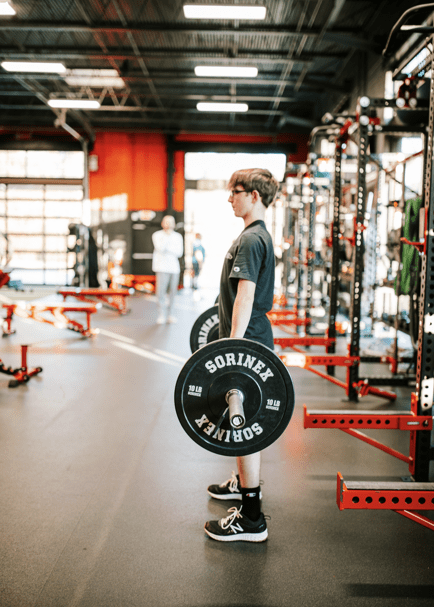
Strength training isn't just about building muscle mass. Emerging research suggests it can be a powerful tool for boosting children's cognitive function and mental well-being, offering benefits that go beyond the gym.
While cardio has long been the champion for brain health, studies are highlighting the unique advantages of strength training for young minds. Here's how pumping iron can positively impact your child:
Sharper Thinking: Strength training appears to enhance activity in the prefrontal cortex, the brain's region responsible for crucial executive functions like planning, focus, and self-control [1].
Memory Boost: Research suggests children who participate in resistance training might experience improved memory consolidation, similar to the benefits observed in adults [1].
Emotional Well-being: Strength training appears to be a valuable tool for promoting mental health. Studies indicate it can help reduce symptoms of anxiety and depression in children [2].
These benefits likely stem from a combination of factors. Strength training increases blood flow to the brain, delivering essential nutrients and promoting the growth of new connections between brain cells. Additionally, exercise releases endorphins, natural mood elevators that combat stress and improve overall well-being.
While research on strength training and children's cognition is ongoing, the initial findings are encouraging. The Centers for Disease Control and Prevention (CDC) recommends at least 60 minutes of moderate-to-vigorous physical activity daily for children [3]. Strength training, incorporated safely and appropriately, can be a valuable addition to this routine.
For decades, a persistent myth has discouraged parents from letting their children lift weights: the fear of stunted growth. However, this concern is firmly rooted in misinformation. Scientific research overwhelmingly demonstrates that properly designed strength training programs are safe and beneficial for growing bodies, offering a multitude of advantages without impacting height.
The misconception likely stems from a misunderstanding of growth plates, the soft areas at the ends of long bones where new bone tissue is produced. Injuries to these areas can indeed affect growth, but these typically occur due to significant trauma or improper lifting techniques. Studies published in the journal Pediatrics found no evidence that weight training itself damages growth plates [4]. In fact, properly supervised strength training programs can actually strengthen the bones and surrounding tissues, potentially reducing the risk of future injuries.
Here's why you can ditch the worry and embrace the benefits:
Growth Unaffected: Numerous studies, including a review published in Sports Medicine, have shown that weight training programs have no negative impact on a child's linear growth [5]. Their height potential remains unaffected.
Stronger Bones, Brighter Future: Strength training helps increase bone mineral density, a crucial factor for bone health throughout life. This can help prevent osteoporosis and fractures later in life [6].
Building a Strong Foundation: Properly executed strength training programs can improve posture, balance, and coordination, all of which contribute to a healthy musculoskeletal system in children.
There are many other benefits to strength training, covered in a previous article.
Safety First:
While weight training is safe for children, proper guidance is essential. Consulting a pediatrician or qualified trainer who specializes in youth fitness is vital. They can design a program that uses appropriate weight, focuses on proper form, and minimizes the risk of injury.
By embracing strength training, you can help your child build not only a strong physique but also a strong foundation for lifelong health and well-being.
Remember, the goal is to create a positive and encouraging experience. Keep workouts fun and engaging, and celebrate your child's progress!
By incorporating strength training, you can equip your child not only with a strong body but also with a sharper mind and a brighter emotional outlook.
At D1 Training all workouts are coach led, whether it is group, small group, 1on1 or clinics. Coaching is important to ensure athletes learn proper form, to challenge them and to progress…and progress safely. Check out a previous blog we wrote about proper programming. Even children who have experience with lifting weights can benefit from a professional coach’s guidance. Our programs are also designed to prevent overtraining while promoting progress and growth.
The summer months offer a golden opportunity to introduce your child to the world of strength training. Not only will it keep them active and engaged during their break, but research suggests it can also benefit their brainpower, emotional well-being, and overall physical development. With proper guidance and a focus on form over heavy lifting, strength training can be a safe and rewarding addition to your child's summer routine, laying the groundwork for a healthy and confident future.
Sources:
[1] Strength Training for Young Athletes - Pediatrics (https://publications.aap.org/pediatrics/article/121/4/835/70927/Strength-Training-by-Children-and-Adolescents)
[2] Weight Training in Youth-Growth, Maturation, and Safety: An Evidence-Based Review - Sports Medicine (https://pubmed.ncbi.nlm.nih.gov/34781771/)
[3] Benefits of Strength Training for Children - The American Council on Exercise (https://www.acefitness.org/resources/everyone/blog/5055/youth-fitness-resistance-training/)
[4] Cognitive effects of weightlifting improve students' mental (https://www.t-nation.com/training/tip-let-go-of-control-and-grow/)
[5] Resistance Training Improves Mental Health - The University of New Mexico (https://hsc.unm.edu/news/2022/12/running-medicine-program-enhancing-mental-health-feeling-connectedness.html)
[6] Benefits of Physical Activity - Centers for Disease Control and Prevention (https://www.cdc.gov/nccdphp/dnpao/features/physical-activity-brain-health/index.html)
